|
|
Brodsky Quartet (String Quartet) |
|
Founded: 1972 - Middlesbrough, North Yorkshire, England |
|
Since forming in 1972, the Brodsky Quartet have performed over 3,000 concerts on the major stages of the world and have released more than 60 recordings. A natural curiosity and an insatiable desire to explore has propelled the group in a number of artistic directions and continues to ensure them not only a prominent presence on the international chamber music scene, but also a rich and varied musical existence. Their energy and craftsmanship have attracted numerous awards and accolades worldwide, while their ongoing educational work provides a vehicle to pass on experience and stay in touch with the next generation.
Throughout their career of almost 50 years, the Brodsky Quartet have enjoyed a busy international performing schedule, and have extensively toured the major festivals and venues throughout Australasia, North and South America, Asia, South Africa and Europe, as well as in the UK, where the quartet is based. The quartet are also regularly recorded for television and radio with their performances broadcast worldwide.
Over the years, the Brodsky Quartet have undertaken numerous performances of the complete cycles of quartets by Schubert, L.v. Beethoven, Tchaikovsky, Benjamin Britten, Arnold Schoenberg, Zemlinsky, Anton Webern and Béla Bartók. It is, however, the complete Dmitri Shostakovich cycle that has now become synonymous with their name: their 2012 London performance of the cycle resulted in their taking the prestigious title ‘Artistic Associate’ at London’s Kings Place and, in October 2016, releasing their second recording of the cycle, this time live from the Muziekgebouw, Amsterdam.
The Brodsky Quartet have always had a busy recording career and currently enjoy an exclusive and fruitful relationship with Chandos Records. Releases on the label include ‘Petits Fours’, a celebratory album of ‘Encore’ pieces arranged exclusively by the quartet for their 40th anniversary; a Debussy compilation; ‘In the South’, featuring works by Verdi, Paganini, Wolf and Puccini; ‘New World Quartets’, comprising works by Dvorak, Copland, Gershwin and Dave Brubeck; the quartets of Zemlinsky, including the world premiere recording of his unpublished early quartet; two Johannes Brahms discs, featuring the iconic Piano and Clarinet Quintets; the D. Shostakovich Complete Quartets. For L.v. Beethoven’s 250th anniversary year they have released a highly acclaimed box set of the late quartets.
As well as partnering many top classical artists for their performances and recordings, the quartet have made musical history with ground-breaking collaborations with some of the world’s leading artists across many genres and have commissioned and championed many of the world’s most respected composers.
Awards for recordings include the Diapason D'Or and the CHOC du Monde de la Musique and the Brodsky Quartet have received a Royal Philharmonic Society Award for their outstanding contribution to innovation in programming.
The quartet have taught at many international chamber music courses and have held residencies in several music institutes including, at the start of their career, the first such post at the University of Cambridge and latterly at the Royal Conservatoire of Scotland, where they are visiting International Fellows in Chamber Music. They were awarded Honorary Doctorates by the University of Kent and an Honorary Fellowship at the University of Teesside, where they were founded.
The quartet took their name from the great Russian violinist Adolf Brodsky, the dedicatee of Tchaikovsky's violin concerto and a passionate chamber musician.
Gina McCormack plays a violin made by Alesandro Gagliano, 1749; Ian Belton’s violin is by Giovanni Paolo Maggini, c1615. Paul Cassidy plays on La Delfina viola, c1720, courtesy of Sra. Delfina Entrecanales and Jacqueline Thomas’s cello is by Thomas Perry of Dublin, 1785. |
|
Group History |
|
The 1970's |
|
The Brodsky Quartet started life in the North-East England town of Middlesbrough in 1972. The region was famous for its rich musical culture, with hundreds of children benefiting from free instruments and lessons with a dedicated teaching staff and an extensive network of youth orchestras from beginner to conservatoire level. A forerunner to today’s Sistema model, many alumni can be found in leading roles throughout the music industry to this day.
Inspired by this wealth of opportunity, brother and sister Michael and Jacqueline Thomas with friends Ian Belton and Alexander Robertson, all living within half a mile of each other, used to congregate at the Thomas family home after Youth Orchestra on Friday nights to play quartets; their enthusiasm and passion for the medium took hold.
As the Cleveland Quartet (named after the region in which they lived) they were soon entertaining parents and neighbours with little soirees of highly ambitious repertoire for kids of 10 to 12, moving on to awards at local music festivals and public concerts. (When they came face to face with the long-established US-based Cleveland (Ohio) Quartet at Dartington Summer School in 1974 they conceded that perhaps theirs was the lesser claim on the name, but delayed choosing a new one.)
Performances progressed to concert halls and competitions, including First Prize for Chamber Music at the National Festival of Music for Youth, which culminated in the first ever Schools’ Prom (now a national institution) in which they performed D. Shostakovich to thousands of excited school children in the Royal Albert Hall, London.
In those early days as they discovered D. Shostakovich who was still relatively obscure, his music not readily available in music shops in the West, they were so keen to play the works that they wrote out their own parts from radio broadcasts of the works' premieres.
Whilst becoming the first ever quartet to arrive ready-formed at music college (the RNCM in Manchester) they received the Menuhin Prize for the most promising young group at the first London Quartet Competition (then held in Portsmouth) and changed the name to Brodsky, after the great Russian violinist who was such an inspiration to musical life in Manchester in the early 20th century and himself a dedicated quartet player.
More competition successes followed including the Janacek Medal and Audience Prize at the Evian competition and their studies continued with the Amadeus and Vermeer Quartets as well as their regular teachers in Manchester, Terence Weil, Patrick Ireland, Eli Goren, Nobuko Imai, Yossi Zivoni and Ralph Kirshbaum. At this time they had their first taste of travels abroad as they were often chosen to represent the college in exchanges with institutions all over Europe, frequently sponsored by the British Council, including a visiting scholarship to the Prague Conservatory to study with Milan Skampa. |
|
The 1980's |
|
In 1982 Robertson left the group to pursue other interests and was replaced by violist Paul Cassidy, recently graduated from the RCM in London where he too had developed a passion for string quartets. At this point the group had signed with their first International agent and their Wigmore Hall debut, that same year to great critical acclaim, put them firmly on the map. In the next months they won First Prize at the EBU Competition and six of the seven prizes on offer at the Tokyo Competition, and took up a scholarship to study with Zoltan Sekely in Banff, Canada.
In the same year the quartet was invited to perform for Benjamin Britten’s Memorial Concert and later for the 8th birthday of Sir Peter Pears at the Aldeburgh Festival and Wigmore Hall, where they were Resident Young Artists. On leaving Manchester they held residencies in Sutton Place, Surrey, for South-East Arts, Dartington International Summer School (which lasted 14 years) and later became the first ever string quartet to hold a residency at Cambridge University (for three years) generously sponsored by Patrick Fahey Associates and Citibank. They also worked closely with composers Harrison Birtwhistle, Peter Maxwell Davies, Alexander Goehr and Witold Lutoslawski, the latter exclaiming aloud and tearfully, following a performance of his String Quartet at Dartington, "It's theirs!".|
Their first recording, in 1984, held particular poignancy as it contained Edward Elgar’s String Quartet, dedicated by the composer to the original Brodsky Quartet of the early 20th century. They soon added to their discography through contracts with ASV, IMP and Teldec, for whom they recorded the complete D. Shostakovich Quartets in 1989, (winning the Deutsche Schalplatten Preis and named Record of the Year by Music Week Magazine) in tandem with their performances of all those great works at London’s QEH for the Music from the Flames series, and went on to an award winning recording output from Schubert, L.v. Beethoven, Tchaikovsky to Crumb and a light-hearted encore album, "Brodsky Unlimited".
During this time the quartet had been travelling all over the world and gaining a reputation as one of the leaders in their field, working with many great musicians including Maria-João Pires, Nobuko Imai, Christian Blackshaw, Barry Douglas, Peter Donahoe, Alexander Baillie, and performing complete cycles of the Schubert, B. Bartók, A. Schoenberg, Janacek, Zemlinsky quartets as well as many specially commissioned new works and of course all the classical and romantic era masterpieces their huge repertoire has to offer.
In 1985 they struck up a working relationship with the Japanese designer Issey Miyake who provided them with innovative and unique concert attire, breaking the mold of accepted uniform for musicians, criticised in some quarters but eventually emulated in many. With the emphasis firmly on comfort, practicality and style, Miyake came up with a beautifully modern classic. In a refreshing break from their normal schedule, the quartet took to the cat-walk, playing live for his Men's Show in Paris, 1986. |
|
The 1990's |
|
In 1992, still only in their early 30s, they celebrated their 20th anniversary with a series at London's QEH and their own charity festival for Save the Children and Children in Need, in a little church in a backwater of Maida Vale, London, inviting artists such as Barry Douglas, Evelynn Glennie, Orchestra of the Age of Enlightenment, John Amis and many more.The final concert was the world premiere of a 'Work in Progress' with Elvis Costello whom they had recently met, resulting in the joint writing and recording of the ground-breaking work The Juliet Letters, a song cycle for quartet and voice, which has become an icon of cross-genre output.
Extensive touring continued and recordings were made under the Silva Classics label, including Haydn and W.A. Mozart, Weill and D. Brubeck, who was commissioned to write his only quartet for the Brodskys, and the best-selling Lament compilation CD. They also took part in the "Perfect Day" Platinum single for BBC Children in Need. In 1994, the quartet were given sole use of their own working studio and office at Delfina Studios in Bermondsey, London, under the Patronage of Delfina Entrecanales who has remained a lifelong friend and supporter of the group, not only providing this invaluable workspace free of charge for over 12 years, but also sponsoring concerts and helping with the acquisition of instruments. This favourable working environment, an unusual luxury for a string quartet, afforded them the opportunity to employ their own personal manager, Marjon Koenekoop, who became a much-valued 'fifth member' of the group for many years.
Throughout this busy schedule, the quartet always sought to invest time and imagination in the exploration of their rich repertoire and to break with the accepted norms in concert presentation. They were rewarded in 1998 with a Royal Philharmonic Society Award in recognition of their innovative programming, and an Honorary Fellowship at the University of Teesside, where the quartet had its roots.
The subsequent world tour, documentary and record-breaking cd sales gathered a huge fan base for the album, which endures to this day, as well as the coveted Edison Award. It was re-released for the 15th Anniversary in 2007 with the addition of bonus tracks of encores from the original tour. The long-standing friendship and working relationship with Elvis has continued to play an important part in the quartet’s on-going tour schedule, as well as collaborations with other leading figures from 'across the divide', including Björk and Paul McCartney, performing with the latter at St James' Palace in the presence of Prince Charles, in London and New York for the Standing Stone concert and later for the Memorial Concert of Linda McCartney.
At this time the quartet decided to experiment with a long-standing urge to perform standing, unlike all other groups at the time. After the first attempt they never looked back, released from the constraints of chairs and the resulting back-ache, inspired to project to the audience in a spirit of inclusion, breaking away from the illusion that chamber music is an elitist art form. |
|
The 2000's |
|
They also continued to work with many diverse artists from all genres with whom they have devised exciting and innovative projects: Sting, Elvis Costello, Ron Sexsmith, Amanda Roocroft and Barbara Bonney for the opera Welcome to the Voice by Steve Neive (premiered in New York Town Hall and recorded for Deutsche Gramophon); Theatre du Complicite for their project The Noise of Time based on the life and works of D. Shostakovich; Brian Friel, Lou Stein, with actors Henry Goodman and Rosamund Pike for Performances, a theatre piece for actors and string quartet based on the 2nd Janacek quartet; Julian Nott, Sjon and actor John Telfer for Anna and the Moods, a children’s work for narrator and string quartet; Björk for a specially commissioned work by John Taverner, Prayer of the Heart; further performances and recordings with Joan Enric Lluna, Michael Collins, Dmitri Ashkenazy, Christian Blackshaw, Martin Roscoe, Alexander Baillie, Anne Sofie von Otter, Diana Baroni, Jacqui Dankworth and Björk, including the now legendary Union Chapel acoustic concerts, some of which features on her album Family Tree.
In 1999, Michael Thomas left the group to settle in Seville with his Spanish wife and children and to pursue his conducting career, to be replaced by Andrew Haveron, a graduate of the RCM under Felix Andraevsky. Faced with the enormous task of relearning the huge repertoire, Andrew’s enthusiasm was an inspiration - he even introduced many new works which had so far eluded the quartet, including the stylistically ebullient output of the European/American émigré school, Kreisler, Korngold and co. Recording output gathered pace with Vanguard Classics (later Challenge): in 2000 they released L.v. Beethoven’s Opus 18 quartets, a special project for the Millenium in which six composers were commissioned to write new works in homage to the L.v. Beethoven set of exactly 200 years earlier; then followed a Second Viennese SchoolCycle, Respighi, Sculthorpe and later, under their own label Brodsky Records, L.v. Beethoven op.59s, Janacek, Tchaikovsky and B. Britten complete sets, winning awards Diapason d'Or, CHOC du Monde de la Musique and many others.
In 2003 the quartet devised and realised an educational project aimed at teenagers with the support of the Arts Council and NESTA. This work took them, with a team of composers, writers, artists and musicians, to schools all over the UK where they motivated hundreds of youngsters to write songs for quartet and voice, many of which contributed to the album Moodswings which came out of the project. The format has been repeated in other countries, including Holland and Iceland, with a lasting legacy of many students taking up musical training who might never have done so.
Whilst continuing their travels around the world the quartet had also established residencies in several concert halls to which they returned repeatedly, namely L'Auditori, Barcelona; Palau de la Musica, Valencia; Auditorio National, Madrid; Concertgebouw, Amsterdam; Vredenburg, Utrecht; Teatro Communale, Bologna; Brisbane Powerhouse; Sydney Opera House, Snape Maltings, Aldeburgh; St George's, Bristol; and Gulbenkian, University of Kent, Canterbury where they were awarded an Honorary Doctorate in 2004.
In 2007, Andrew left the group to take up the post of Leader of the BBC Symphony Orchestra and was replaced by Daniel Rowland, highly respected and established chamber musician and soloist. Following Daniel’s enthusiastic arrival and whole-hearted embracing of the quartet’s work ethic and ideal, they began a five-year exclusive residency at London’s Cadogan Hall where they devised many interesting programmes, a highlight being a series called ‘Close To You’, a tribute to the great Hollywood Quartet, emulating their iconic recordings of L.v. Beethoven, J. Brahms and A. Schoenberg, as well as their famous collaboration with Frank Sinatra, for which the wonderful Sir Willard White joined the Brodskys. They also began a three-year visiting residency as ‘International Chair of Chamber Music’ at the Royal Scottish Academy of Music and Drama in Glasgow, now the Royal Conservatoire of Scotland. This led to many openings into the venues and halls of that great city, not least the wonderful Town Hall where they gave the first of their now famous complete-D. Shostakovich-in-a-weekend cycles, which have since been performed world-wide from the north of Norway to the south of Australia and many places in between.
Whilst continuing to tour and record standard repertoire, they also collaborated on several interesting theatrical ventures, including Brian Friel’s play Performances, with Rosamund Pike and Henry Goodman at Wilton’s Music Hall, London; a music-theatre inspired clarinet quintet, In Memoriam, by Paul Barker with Joan Enric Lluna; and their children’s show ‘A Young Person’s Guide to the String Quartet’ with ‘Anna and the Moods’, their 21st century Peter and the Wolf, with the help of human-dynamo and actor John Telfer as narrator and be-wigged Joseph Haydn. |
|
The 2010's |
|
In 2013 the City of London Festival and Derry-Londonderry City of Culture commissioned a work for the quartet and mezzo soprano Lore Lixenberg, to be written by nine composers and eight poets and performed across Europe ending in Jerusalem, following the idea of a modern-day Winterreise. Trees, Walls and Cities is a celebration of cross-boundary unity, the futility of division and a life-affirming journey of humanity. Also for the City of Culture celebrations, the quartet re-visited the Brian Friel play in his home town, Derry, this time with Alan Corduna and director Adrian Dunbar.
In 2015 the quartet made a long-awaited return trip to New Zealand, touring both islands from top to bottom under the excellent care of CMNZ. In 2016 they recorded and toured Australia with Katie Noonan a song cycle by ten leading Australian composers to the words of poet and activist Judith Wright, With Love and Fury and in 2017 they gave the first ever D. Shostakovich Cycle at the Perth International Arts Festival.
New friendships with concert halls and promoters throughout the world include the Konvergencie Festival, Bratislava, and the fabulous new Muzikgebouw in Amsterdam, where they finally realized their ambition to re-record the D. Shostakovich Cycle, this time live and over one weekend funded with the help of many Friends of the Brodsky Quartet but especially by the huge generosity of Professor Neil Rackham.
Education work continues with masterclasses in conservatoires across the world; London’s Trinity and RCM, Menuhin and Purcell Schools, Manchester’s RNCM, Birmingham and Glasgow conservatoires, Pro Corda, Durham University, the Australian Academy in Melbourne (ANAM), Mexico’s Instrumenta Oaxaca and classes in Cyprus, Serbia, Hungary, Holland, Norway, Switzerland and Brazil.
The quartet’s 40th anniversary year was full of exciting opportunities for celebration, top of the list being a return to the D. Shostakovich Weekend at the newly opened and fabulous King’s Place, London, leading to an invitation to become Quartet in Residence there. Also in that year, the quartet presented at Kings Place and throughout Europe a concert called the ‘Wheel of 4tunes’, in which a huge wheel containing 40 string quartets was spun four times by audience members to ‘select’ a programme - fun but extremely stressful! Each year since at Kings Place has afforded great opportunities for curating and performing in adventurous series, not least the brilliant Chamber Music Unwrapped Top 50 chamber works as voted by the public, centenary celebrations for Benjamin Britten and Andrej Panufnik, the Zemlinsky Immersion Day, Cello Unwrapped and many others.
Continuing collaborations with composers Osvaldo Golijov, Theo Verbey, Robin de Raaff, Isidora Zebeljan, Roxanna Panufnik, Andrea Tarrodi and Ryota Komatsu, as well as fellow performers Michael Collins, Natalie Clein, Martin Roscoe, Natacha Kudritskaya, Dawn Upshaw, Lore Lixenberg, Jacqui Dankworth, Charlie Wood, Sir Willard White, David Hansen, Eddie Perfect, Katie Noonan and Topology have made for a very exciting decade so far.
The highlight of 2017 was appearing at the famous Amsterdam Prinzengracht outdoor concert, televised live, as the first-ever String Quartet to take the starring role, with guests Nino Gvetadze, Marcelo Nisinman and Zoran Markovic. The audience sang, swayed, laughed and cried as works from the classical quartet repertoire took them by surprise. Maybe not such an elitist art-form after all..
The icing on the cake of this fifth decade has been the exciting teaming together with Chandos Records, with whom the quartet have already released eight albums, starting with the celebratory Petits Fours - encores for the 40th birthday - and encompassing every era of their rich repertoire, culminating in the highly acclaimed live recording of the D. Shostakovich Cycle.
The last years of the decade will see a release of E. Elgar's two great World War I works, the String Quartet and the Piano Quintet with Martin Roscoe, and culminate in the completion of their Late L.v. Beethoven cycle. |
|
The 2020's |
|
Approaching the Roaring ‘20s it’s a fond farewell to Daniel who has left the group to concentrate on his solo work, and hello to the wonderful Gina McCormack as new First Violinist. Gina is a highly sought-after violinist, who has dedicated her musical life to playing quartets. As a consequence she has not only performed but recorded much of the rthat has become synonymous with the Brodsky Quartet. And so it seems, the stars have aligned to bring these two musical forces together. |
|
Members |
|
1972-1982:
Michael Thomas
Ian Belton
Alexander Robertson
Jacqueline Thomas
1982-1999:
Michael Thomas
Ian Belton
Paul Cassidy
Jacqueline Thomas
1999-2007:
Andrew Haveron
Ian Belton
Paul Cassidy
Jacqueline Thomas
2007-2019:
Daniel Rowland,
Ian Belton
Paul Cassidy
Jacqueline Thomas
2019-2021:
Gina McCormack, violin
Ian Belton, violin
Paul Cassidy, viola
Jacqueline Thomas, cello
2021-:
Krysia Osostowicz, violin
Ian Belton, violin
Paul Cassidy, viola
Jacqueline Thomas, cello |
|
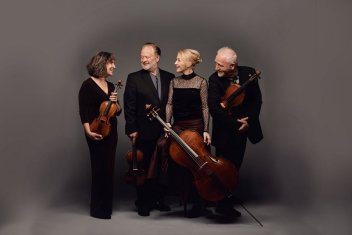
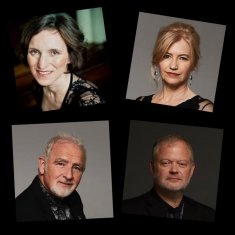
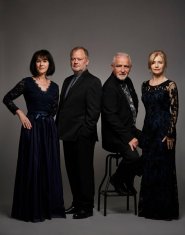
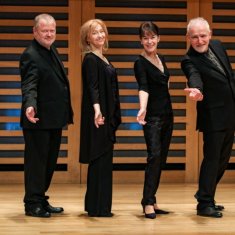
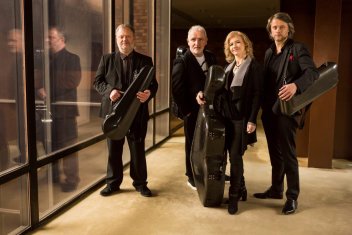
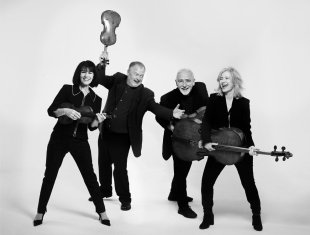
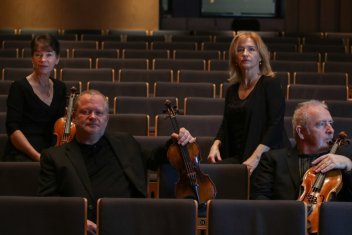
|
|
Sources:
Brodsky Quartet Website ^ Facebook page
Wikipedia Website (May 2021)
Photos 03, 13: Sarah Cresswell; Photos 04, 15: Duncan Elliot Matthews; Photo 05: Martina Zuzana Šimkovičová; Phoro 14: Bim Photography; Photo 17: Ivica Horakova
Contributed by Aryeh Oron (July 2021) |
|
Brodsky Quartet : Short History | Bach Discography: Recordings of Instrumental Works |
|
Links to other Sites |
|
Brodsky Quartet (Official Website)
Brodsky Quartet page on Facebook
Brodsky Quartet (Wikipedia) |
|
|